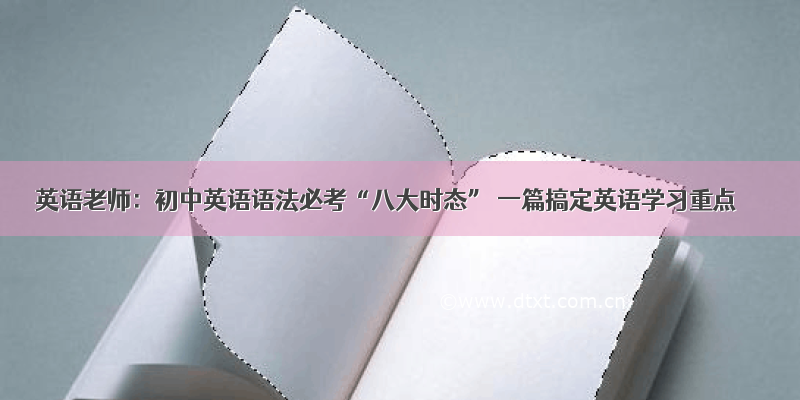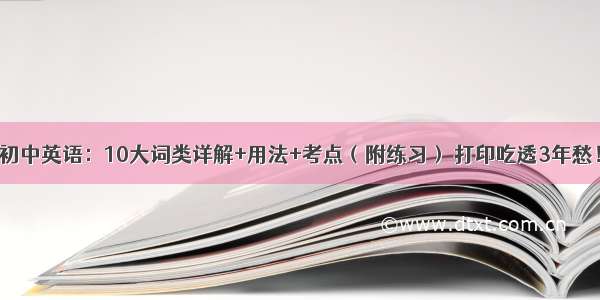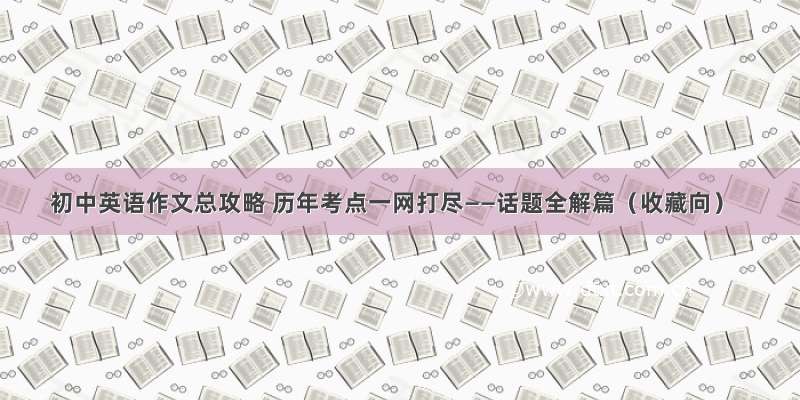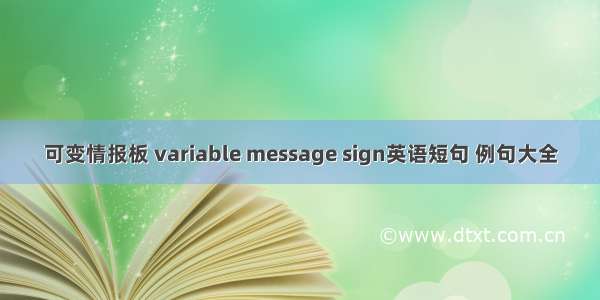
初中英语句型大全
句型:
疑问句型
What is this?
结构︰问句:What+be 动词+this(that…)?
答句:This(that…)+be 动词+a book(pen…)。
说明︰此句型意为"这(那)是什么?这(那)是书(钢笔…)"。what(什么)叫做"疑问词",用于询问"事物",通常放在句首,后接 be <动词>,再接<主语>,第一个字母 w要大写,句尾要加问号(?),位置不可排错。
What is this? This is a chair. 这是什么?这是一张椅子。
What"s this? It"s a book. 这是什么?它是一本书。
What is that? That is a desk. 那是什么?那是一张书桌。
What are these?
结构︰问句:What are+these/those…?
答句:These/Those are+复数名词(+s/es)。
说明︰<主语>与<动词>的形式要一致,is 后面接单数<名词>,are 后面要接复数<名词>。
What are these? These are books. 这些是什么?这些是书。
What are those? Those are cups. 那些是什么?那些是茶杯。
What are they? They are glasses. 它们是什么?它们是玻璃杯。
What are you?
结构︰问句:What+be 动词+主语(人)…?
答句:主语+be 动词+a student…。
说明︰此句型意为"你是做什么事情的?我是学生…"。疑问词 what 除了询问事物之外,还可用于询问"人的职业或身分"。be <动词>随<人称代名词>的变化而改变形态,如:I am,we are,you are,he is…。
What are you? I am a student. 你是做什么事情的?我是一名学生。
What is she? She is a teacher. 她是做什么事情的?她是一名教师。
Are you a ...?
结构︰问句:Be 动词(am,are,is)+主语+…?
肯定简答:Yes,主语+am(are,is)。
否定简答:No,主语+am(are,is)not。
说明︰在否定<简答句>中,<主语>和 am,is,are 可以缩写;在肯定<简答句>中则不可。
Is he a student? Yes, he is. (No, he isn"t.) 他是学生吗?是的,他是。(不,他不是。)
Are you a teacher? Yes, I am. (No, I"m not.) 你是教师吗?是的,我是。(不,我不是。)
Is that a clock? Yes, it is. (No, it isn"t.) 那是钟表吗?是的,它是。(不,它不是。)
What is your name?
结构︰问句:What+is+所有格+name?
答句:所有格+name+is+名字。
说明︰"my,your,his,her"为单数人称的<所有格>;<所有格>后面必接<名词>,即"<所有格>+<名词>";<所有格>不可与 a,an,this,that,these 或 those 紧接一起使用。
What is your name? My name is Sue. 妳叫什么名字?我的名字叫苏。
What is his name? His name is John. 他叫什么名字?他的名字叫约翰。
What is her name? Her name is Jean. 她叫什么名字?她的名字叫珍。
Who is that ...?
结构︰问句:Who+be 动词+that+形容词+名词?
答句:That is+名字。
说明︰Who 是<疑问代名词>,询问人的"姓名"或"关系";将<形容词>直接放在<名词>前面,叫做"前位修饰"。
Who is that short boy? That is Bill. 那位矮男孩是谁?那位是比尔。
Who is that tall girl? That is Mary. 那位高女孩是谁?那位是玛丽。
Who is that fat man? He is my uncle. 那位胖男子是谁?那位是我叔叔。
Where is ...?
结构︰问句:Where+be 动词(am,are,is)+主语…?
答句:主语+be 动词+in the+名词…。
说明︰问句是"Where ...?",简答时可用<副词词组>"In/On the+<名词>"。
Where is Sue? She is in her room. 苏在那里?她在她的房间里。
Where are your books? On the desk. 你的书在那里?在书桌上。
Where is your mother? She is in the kitchen. 你妈吗在哪里?她在厨房里。
Are you V-ing ...?
结构︰Am(Are,Is)+主语+现在分词…?
说明︰此句型意为"<主语>(人,物)正在…吗?"。这一<句型>转换的三要素是:be <动词>移到句首;改为大写;句尾用问号。
Is Mary sleeping? 玛丽正在睡觉吗?
Are you reading a book? 你正在看书吗?
Is the dog playing? 小狗正在玩耍吗?
What are you doing?
结构︰问句:What+am(are,is)+主语+现在分词?
答句:主语+am(are,is)+现在分词…。
说明︰"<主语>(人)正在做什么?<主语>(人)正在…"。注意:<祈使句>的动词只能用原形,不可造<现在进行式>;表示"瞬间产生"的动作的<动词词组>,如 sit down,stand up,不可造<现在进行式>。
What am I doing? You are reading a book. 我正在做什么? 你正在阅读一本书。
What are the girls doing? They are singing. 姑娘们正在做什么? 她们在唱歌。
What is Bill writing? He is writing a letter. 比尔在写什么? 他在写一封信。
How old are you?
结构︰问句:How old+be 动词+主语(某人)?
答句:主语(某人)+be 动词+year(s) old。
说明︰此句型意为"某人几岁?某人是…岁"。该句型中,<疑问词>要用 how,不可用 what;且 be <动词>(am,is,are)要和后面的<主语>(某人)配合;答句中的"year(s) old"可以省略。
How old are you? I am twelve (years old). 你几岁?我十二岁。
How old is your sister? She is thirteen years old. 你的姊妹几岁?她十三岁。
How old is John? He is one year old. 约翰几岁?他一岁。
What time is it?
结构︰问句:What time is it?
答句:It is+数字+o"clock。
说明︰此句型意为"现在是几点钟?现在是…点钟"。问句中 what 当<形容词>,修饰后面的<名词> time;time 当时间解时,只能用单数,不可用复数。
What time is it? It is ten o"clock. 现在是几点钟?现在是十点钟。
What time is it? It is six o"clock. 现在是几点钟?现在是六点钟。
What time is it? It is nine o"clock. 现在是几点钟?现在是九点钟。
Do you + V ...?
结构︰问句:Do/Does+主语+原形动词…?
肯定简答:Yes,主语+do/does。
否定简答:No,主语+don"t/doesn"t。
说明︰肯定句中,如有一般<动词>(speak,work,teach…),则在句首加<助动词> do 或 does,并将一般<动词>改为原形<动词>(不加s或es),即构成<疑问句>。
Do you speak English? Yes, I do. (No, I don"t.)
你讲英语吗?是的,我讲英语。(不,我不讲英语。)
Does she have a cat? Yes, she does. (No, she doesn"t.)
她有一只猫吗?是的,她有一只猫。(不,她没有一只猫。)
Do they work in office? Yes, they do. (No, they don"t.)
他们在办公室里工作吗?是的,他们在办公室里工作。(不,他们不在办公室里工作。)
What time do you + V ...?
结构︰问句:What time+do/does+主语+原形动词…?
答句:主语(某人)+一般动词…+时间。
说明︰此句型意为"某人几点做某事?"<助动词> do 或 does 的选择依<主语>而定,若<主语>为第三人称单数,用 does;其它用 do。
What time do you get up? I usually get up at six. 你几点起床?我通常六点起床。
What time does he go to bed? He usually goes to bed at ten.他几点就寝?他通常十点就寝。
What time does your class begin? It begins at eight-ten.
你的课几点开始?八点十分开始。
What day is today?
结构︰问句:What day is today?
答句:It"s+Sunday/Monday/…。
说明︰此句型意为"今天是星期几?今天是星期日/星期一/…。"it 可用于指"星期的名称",但 this或 that 不可以;一星期七天的名称,都是<专有名词>,开头的首字母要大写,前面不加<冠词>。
What day is today? It"s Sunday. 今天是星期几?今天是星期日。
What day is today? It"s Wednesday. 今天是星期几?今天是星期三。
What day is today? It"s Saturday. 今天是星期几?今天是星期六。
How many N are there ...
结构︰问句:How many+复数名词+are there in/on+名词?
答句:There is/are+单数(复数)名词+in/on+名词。
说明︰此句型意为"在某处有多少…?在某处有…。"该句型中,many 修饰复数<名词>;又因本句型是 <疑问句>,故用 are there,不可用 there are。
How many seasons are there in a year? There are four seasons in a year.
一年有几个季节? 一年有四季。
How many days are there in a week? There are seven days in a week.
一星期有几天? 一星期有七天。
How many lessons are there in this book? There are twelve lessons in this book.
这本书里有几课? 这本书里有十二课。
How many ... do you have?
结构︰问句:How many+复数名词+do/does+主语+have?
答句:主语+have/has…+复数名词+…。
答句:主语+don"t/doesn"t have…+复数名词…。
说明︰"How many"后面接复数<可数名词>,复数<名词>的前面可用 many,a lot of,a few,some,few,any,no 等修饰。
How many books do you have? I have a lot of books. (I don"t have any books.)
你有几本书? 我有许多书。(我没有书。)
How many sweaters do you have? I have three sweaters. (I don"t have any sweaters.)
你有几件毛衣? 我有三件毛衣。(我没有毛衣。)
How many friends does she have? She has a lot of friends. (She doesn"t have many friends.)
她有几个朋友? 她有许多朋友。(她没有许多朋友。)
How much ... do you have?
结构︰问句:How much+单数不可数名词+do/does+主语+have?
答句:主语+have/has…+单数不可数名词。
答句:主语+don"t/doesn"t have…+单数不可数名词。
说明︰"How much"后面接单数<不可数名词>,单数<不可数名词>前面可用 much, a little,some,little,any,no 等修饰。
How much tea does he have? He has a lot of tea. (He doesn"t have any tea.)
他有多少茶? 他有很多茶。(他没有茶。)
How much homework do they have? They have a lot of homework. (They don"t have much homework.) 他们有多少家庭作业? 他们有许多家庭作业。(他们没有许多家庭作业。)
How much fruit do they have? They have a lot of fruit. (They don"t have a lot of fruit.)
他们有多少水果? 他们有许多水果。(他们没有许多水果。)
How much do(es) ... cost?
结构︰How much do(es)+某物+cost…?
说明︰此句型意为"某物值多少钱?"。how much 用来询问商品的价格。还可以写作:"How much+ be <动词>+某物?"。
How much does this computer cost? (=How much is this computer?)这部计算机值多少钱?
How much do the vegetables cost? 这些蔬菜值多少钱?
How much do the movie tickets cost? 这些电影票值多少钱?
Did ... V ...
结构︰Did+主语+原形动词+…过去时间?
说明︰将肯定句中的过去式改为"Did+原形<动词>",并将 Did 放在句首,句尾用问号,即构成过去式的<疑问句>。
Did he clean the room yesterday? 他昨天打扫房间吗?
Did she wash the skirt yesterday? 她昨天洗这裙子吗?
Did your brother play in the park this morning? 你弟弟今天上午在公园玩耍吗?
Did he eat lunch yesterday? 他昨天吃午饭吗?
Did you see any elephants in the zoo last week? 上星期你在动物园里看到大象了吗?
Did Sue have her breakfast at eight? 苏在八点钟吃过早餐了吗?
Do you ever + V ...?
结构︰问句:Do/Does+主语+ever+原形动词…?
答句:No,主语+never+一般动词(加s或es)…。
说明︰ever 通常用于<疑问句>,never 通常用于否定回答;never 也可放在句首,后接原形 <动词>,形成否定<祈使句>,如例句4。
Do you ever use a computer? No, I never use a computer.
你曾经使用计算机吗?不,我未曾使用过计算机。
Does Tom ever get up late? No, Tom never gets up late.
汤姆曾经晚起床吗?不,汤姆未曾晚起床过。
Does Sally ever play the piano? No, Sally never plays the piano.
萨莉曾经弹钢琴吗?不,萨莉未曾弹过钢琴。
Never be late for school, Bill. 比尔,上学绝不可迟到。
What year was he born in?
结构︰What date/year+was/were+主语+born+on/in?
说明︰此句型意为"你出生于几月几日(那一年)?"。born 是<原形动词> bear 的过去<分词>,在文法上当 <形容词>,前面常有 was 或 were;中文说"某人出生",英语应说:"某人+was/were born…"。
What year were you born in? 你出生于那一年?
What date was your mother born on? 你母亲出生于几月几日?
What month was your sister born in? 你妹妹出生于几月?
What will you do on ...?
结构︰What will/did+主语+do+on+时间?
说明︰此句型意为"某人在某时间将做什么?(未来式)某人在某时做了什么事?(过去式)"。指特定的日期(如几月几日)、星期几或星期几的早上(下午,晚上),要用介系词on。
What will you do on Teacher"s Day? 你在教师节将做什么事?
What will they do on Christmas Eve? 他们在圣诞夜将做什么事?
What will Helen do on her birthday? 海伦在她生日那天将做什么事?
What did John do on New Year"s Day? 约翰在元旦做了什么事?
What did Mary do on Youth Day? 玛丽在青年节做了什么事?
What did the suspect do on July ninth? 嫌疑犯在七月九日做了什么事情?
How do you + V ...?
结构︰问句:How+do+主语+一般动词…?
答句:主语+一般动词…+情状副词。
说明︰How 是问情况的<疑问副词>,表示"怎样…?"。用于说明"状态或性质"的副词,称为 <情状副词>。当用来修饰<不及物动词>时,<情状副词>位于其后;当用来修饰<及物动词>时,<情状动词>位于<及物动词>的前面或后面。
How did you do your work? I did my work happily.
你怎样做你的工作? 我很快乐地做了我的工作。
How did Mrs. Lin look at Mr. Lin? She looked at Mr. Lin coldly.
林太太怎样注视林先生? 她冷漠地注视林先生。
How does Mr. Wang drive his taxi? He drives his taxi carefully.
王先生怎样驾驶他的出租车? 他小心地驾驶他的出租车。
You are ..., aren"t you?
结构︰肯定句,+否定式助动词+主语?
说明︰这是一种反意<疑问句>,其结构特点是:第一部分是肯定式,第二部分就用否定式。直述句的<主语>是<名词>时,附加问句的<主语>要用<代名词>代替:it 代替 this, that,<不定词>(当<主语>)或<动名词>(当<主语>)等;they 代替 these,those, people 等。下列<助动词>的否定缩写式较易弄错:will not->won"t;would not-> wouldn"t;should not->shouldn"t;can not->can"t;could not->couldn"t; might not->mightn"t;ought not->oughtn"t。直述句有一般<动词>现在式,则附加问句用 do 或 does 代替;有一般<动词>过去式,则附加问句用 did 代替。
They"re ready, aren"t they?(读降调)他们准备好了吧?(读升调)他们准备好了,不是吗?
Mike has a car, doesn"t he?(读降调)麦克有辆车,是吧?(读升调)麦克有辆车,不是吗?
The secretary typed the letter, didn"t she? 是秘书打了这封信,不是吗?
They will go to Europe, won"t they? 他们将去欧洲,不是吗?
You are the teacher, aren"t you? 你就是老师,不是吗?
I suppose you have been in our woods, haven"t you?我推想你在我们的森林里呆过,不是吗?
I know he had a good time last night, didn"t he? 我知道他昨天晚上玩得很愉快,不是吗?
The wall plug is broken, isn"t it? 墙上的插座坏了,不是吗?
Clean parks are beautiful, aren"t they? 干净的公园是美丽的,不是吗?
You can do it, can"t you? 你会做它,不是吗?
We should rise early, shouldn"t we? 我们应该早起,不是吗?
He isn"t ..., is he?
结构︰否定句,+肯定式助动词+主语?
说明︰这是另一种反意<疑问句>。否定结构在第一部分,第二部分就要用肯定结构。对反意<疑问句>的回答和对否定式一般<疑问句>一样,要看答句。
He isn"t a manager, is he? -- Yes, he is. (No, he isn"t.)
他不是经理,是吧?--不,他是经理。(是的,他不是经理。)
Mike doesn"t have a car, does he? 麦克没有车,是吗?
The secretary didn"t type the letter, did she? 秘书没有打过这封信,是吗?
They won"t go to Europe, will they? 他们不会去欧洲,是吗?
You aren"t the teacher, are you? 你不是老师,是吗?
I don"t think he can answer the question, can he? 我想他无法回答这个问题,是吗?
What in the world ...?
结构︰疑问词+in the world/on earth/ever+其它
说明︰此句型意为"究竟…?到底…?"。这是特殊<疑问句>的强调说法。in the world,on earth 和 ever是强调疑问词的<词组>。
How in the world will he do it? 他到底将如何做这件事?
What in the world do you mean? 你的意思究竟是什么?
How on earth did you know it? 你到底是怎么知道的?
Who on earth told you that? 那件事究竟是谁告诉你的?
Where ever did you lose it? 你到底在哪儿丢的呀?
What in the world are they hoping for? 他们到底想要什么?
Are you ... or ...?
结构︰一般疑问句(读升调)+or+一般疑问句(读降调)
说明︰此句型意为"是…还是…?"。这是选择<疑问句>,前面都是一般<疑问句>,后面的问句如与前面有相同的部分,都可以省略。
Shall we come to see you or will you come to see us?
是我们来找你们,还是你们来找我们?
Are you from the America or from the England? 您是美国人还是英国人?
Will he go on Monday or on Tuesday? 他是星期一走还是星期二走?
Would you like coffee or tea? 你是要咖啡还是茶?
What ..., + A or B?
结构︰特殊疑问句(读降调),+A(读升调)or B(读降调)
说明︰这种选择<疑问句>使用得相当广泛,其特点是:前面的特殊<疑问句>已经明确地指出了要问的内容,再补充几项具体事物让对方做出肯定的答复。其语调是"降-升-降"调。
What would you like - coffee or tea? 你要什么?咖啡还是茶?
Which would you rather to buy - silk or cotton? 您想买什么?丝还是棉?
Where did you go: to Tianjin or to Beijing? 您去了哪里?天津还是北京?
When will you go to the Fair, tomorrow or some other day?
你何时去交易会?明天还是另找哪一天?
... what/which ...
结构︰主要子句+疑问词(what/how/which/why 等)+子句
说明︰这是间接<疑问句>。疑问词后面的语句采用正常词序,不采用特殊<疑问句>所用的倒装词序。全句末尾大多用句点,但也有用问号的。直接问句改为间接问句或间接句时,原先的<疑问句>要改为肯定句或<否定句>的顺序;<助动词>如 will,should,would, must,may,can 等,须照抄,不可去掉;<助动词>如 do,does,did,必须去掉,再将它后面的原形<动词>改为适当的形式。
I"d like to know how old the manager is. 我想知道经理有多大年纪。
He inquired how it was done. 他问这事做得怎么样了。
Please advise me which item I should buy. 请问我该先买哪个品种。
Tell me why it is so important? 告诉我为什么此事这么重要?
They do not know what the words mean. 他们不知道这些字的意思是什么。
Tell me what happened yesterday. 告诉我昨天所发生的事。
What they talked about is what we want to know. 他们谈论什么是我们所想要知道的事。
She washed her hair every night and measured how much it grew in a week.
她每晚洗头发,而且量量看一星期长多少。
You will never know how much your encouragement meant to me.
你决不会知道你的鼓励对我多么有意义。
... whether/if ...
结构︰主要子句+whether/if+子句
说明︰此句型意为"…是否…"。口语中使用 if 较为普遍。如果子句中带有 or not 等词,则只能用 whether;另外,whether 不能引导否定的间接<疑问句>,而 if 则可以。
He asked me the question whether the price was too high. 他问我价格是否太高。
They asked him whether the quality is fine or not. 他们问他质量是否好。
Tell me whether you like this color. 告诉我你喜不喜欢这种颜色。
Tell me if it doesn"t rain. 告诉我是否下不了雨。
Ask him if it is true. 问他那是不是真的。
I wonder if he is in the school. 我想知道他是否在学校。
Do you know if/where ...
结构︰一般疑问句+疑问词(what/where/when 等)+子句
说明︰此句为双重<疑问句>。疑问词后面采用正常词序,不用倒装词序。
Can you tell me where the teacher has gone? 你能告诉我老师到哪里去了吗?
Have you any idea where he comes from? 他是哪里人,您知道不知道?
Do you know if they like this new item? 你知道他们是否喜欢这个新品种?
Do you know who wants to go with me? 你知道谁想跟我一起去吗?
Do you know when the train will leave? 你知道火车何时开吗?
Can you tell me how much you earn a month? 你能告诉我你一个月赚多少吗?
He is ..., is he?
结构︰肯定式陈述句+肯定式反问句
说明︰这种疑问<句型>的前后一致,都是肯定式结构。后一部分进一步强调前一部分的内容,是不需要回答的一种修辞方式。
We are old friends, not strangers, right? 我们是老朋友了,不是陌生人,是吗?
He"s a capable businessman, is he? 他是一位很有能力的业务员,可不是吗?
So you come importing Chinese textiles, do you? 原来你是来进口中国纺织品的,是么?
So you"ve been to Shanghai, have you? 原来你去过上海,是吧?
... what ...?
结构︰…疑问词(在句中任何位置上)…
说明︰疑问词不是位于句子开头,而是在句子中任何位置上,这种方法十分简单,因此在口语中经常出现。
Two times what number makes ten? 什么数的两倍是十?
You will go where? 你要到哪里去?
You are twenty-what this year? 你今年二十几岁?
He"s your who? 他是你什么人?
What/How about + N/V-ing?
结构︰What/How about+名词/动名词?
说明︰此句型意为"…如何?"。这是征求对方意见或提议的委婉说法。
What about the name Smith? 史密斯这个名字怎么样?
What about going to a movie? 去看场电影如何?
What about lending me some money? 借点钱给我如何?
What about washing the car on Sunday? 礼拜天洗车怎么样?
How about the others? 剩余的怎么样?
How about a drink? 来一杯吧?
How about a cup of coffee at a nearby coffee shop? 去附近的咖啡屋喝杯咖啡吧?
What if ...?
结构︰What if+主语+动词
说明︰此句型意为"如果…的话怎么办呢?"。但经常用于反语,有时也变成"即使…也没关系"之意。
What if it is true? 如果这是真的又该如何呢?
What if he doesn"t agree? 如果他不同意该怎么办呢?
What if he comes back now? 如果他现在回来怎么办?
What if the boy"s parents should die? 如果那男孩的父母死了该怎么办呢?
What if I fail! 即使我失败了又怎样!
What ... for?
结构︰What+助动词+主语+动词…+for?
说明︰此句型意为"为什么…?"。相当于"For what…?"
What are you running for? 你为什么在跑步?
What do you want it for? 你为什么要那个?
What did they go there for? 他们为什么去那里?
How else ...?
结构︰How else+助动词+主语+助动词?
说明︰此句型意为"…还有别的方法吗?"。
How else should a father in this modern world express his affection and concern for his own son? 现代这个世界上,父亲还应该有别的方法来对自己的儿子表示爱护和关心吗?
How else can the doctor save him? 医院还有别的方法可以救他吗?
How else can I apologize for her? 我还能有别的方法可以向她道歉吗?
假设法句型
If + Present Tense ..., S + will/shall + V ...
结构︰If+现在式…,S+未来式…
说明︰if 子句用现在式,表示须具备的条件,主句用未来式表示可能的结果,整句含意为"如果…,那么…"。will 用于所有的人称,在 I 和 we 之后可用 shall 代替 will。若主句的主语为 I 或 we 时,可以用 shall 代替 will。像 if necessary(如果需要),if possible(如果可能),if so(如果这样)等固定词组实际上是省略了的 if 子句。
If I lose my job, I will/shall go abroad. 如果我失业了,我就出国。
If I have a headache, I will take an aspirin. 如果我头痛,我就服一片阿斯匹林。
If it rains, we will stay at home. 如果下雨,我们将待在家里。
If the weather clears, we"ll go for a walk. 如果天晴,我们就去散步。
If the weather doesn"t clear, we won"t go for a walk. 如果天不晴,我们就不去散步。
Inflation may be rising, if (it is) so, prices will go up.
通货膨胀率可能上升。如果是这样,物价就会上涨。
If possible, She wants to go with us. 可能的话,她想跟我们一起去。
Sterling may fall, if (this should be) so, interest rates will rise.
英国货币可能贬值,如果果真如此,利率就会上升。
If + Present Tense ..., S + Modal Verb ...
结构︰If + 现在式,主语+情态助动词
说明︰本句型实为
If it is fine tomorrow, we can go out. 如果明天天气好,我门可以出门。
If it is fine tomorrow, we could go out. 如果明天天气好,我门能够出门。
If it is fine tomorrow, we may go out. 如果明天天气好,我门可能出门。
If it is fine tomorrow, we might go out. 如果明天天气好,我门可能出门。
If it is fine tomorrow, we should go out. 如果明天天气好,我门宜于出门。
If it is fine tomorrow, we ought to go out. 如果明天天气好,我门宜于出门。
If it is fine tomorrow, we must go out. 如果明天天气好,我门必须出门。
If I should ..., Imperative Sentence.
结构︰If I+should ...+祈使语气
说明︰
If you should see him, please give him my regards. 如果你见到他,请代我向他致意。
Should you see him, please give him my regards. 如果你见到他,请代我向他致意。
If you should happen to see him, please give him my regards.
如果你万一见到他,请代我向他致意。
Should you happen to see him, please give him my regards.
如果你万一见到他,请代我向他致意。
If you should write to her, send her my love. 如果你给她写信,请代我向她问候。
Should you not wish our agent to call, please let us know.
你若不希望我们的代理人去造访,请告之。
Should you be interested in our offer, please contact us.
你若对我们的报价感兴趣,请与我们联系。
If I should ..., I will ...
结构︰If…should…,…would(will)/should(shall)等+原形动词
说明︰这是表示与未来事实相反的假设<句型>,if <子句>要用<助动词> should,译成"万一"。should可置于<主语>前,将 if 省略。<主要子句>的<助动词>则视可能性做变化:若可能性低,则为过去式,若可能性高,则为现在式。should 可以提前,而将 if 省略。
If he should come, I would tell him the truth. 万一他来,我会把真相告诉他。
If he should come, I will tell him the truth. 万一他来,我一定会把真相告诉他。
Should the boy come again, I would throw him out. 要是那男孩在来,我就把他撵出去。
If it should rain, our plan would be spoiled. 万一下雨,我们的计划就泡汤了。
Should that be true, the contract would be canceled. 假如那是真的,合约就该取消。
Should another world war break out, what would become of human beings?
万一另一次世界大战爆发,人类将会发生什么事?
If I were to ..., I ...
结构︰If…were to…,…would/should 等+原形动词
说明︰这也是表示与未来状况相反的假设<句型>,与"if ... should, ..."大致相同,但"if ... were to"所表示的可能性更低,通常用以表示"与真理相反"的<假设语气>。
If the sun were to rise in the west, he would pass the exam.
要是太阳从西边出来,他就会通过考试--他不可能通过考试。
If I were to be born again, I would like to be a bird. 我要是再活一次,我想当一只鸟。
If the sun were to disappear, what would the earth be like?
万一太阳消失了,地球会变成什么样子?
Were I to die tomorrow, what would my children do?
万一明天我死了,我的孩子们将怎么办呢?
If I + V-ed, I would ...
结构︰If…+过去式动词…,主语+过去式助动词(would/should 等)+原形动词
说明︰这是与现在事实相反的假设句型。if <子句>中的
If I knew his address, I could write to him. 如果我知道他的住址,我会写信给他。
If I were free now, I might call on him. 如果我有时间,我可能会去看他。
If you were in my shoes (=Were you in my shoes), what would you do?
如果你站在我的立场,你会怎么做?
Were I rich enough, I would buy a sports car. 如果我有足够的钱,我就买一辆赛车了。
How happy I would be if I were a few inches taller! 要是我再高几寸,我会好高兴。
If I had a car, I could take her for a drive. 如果我有车, 我就带她去兜风了。
If I had binoculars, I could see that comet clearly.
如果我有望远镜,我就可以清楚地看见那颗彗星。
It is time that ...
结构︰It is(high)time+(that)+主语+过去式动词
说明︰此句型意为"已经到了…的时间了"。过去式<动词>处有时亦使用"should+<动词>原形"。that <子句>也能用 to <不定词>来表示。
It is time he went to bed. 该是他睡觉的时间了。
It is time that you left for the duty. 该你当班了。
It is time that you reflected upon your mistakes. 该是你反省思过的时候了。
It is high time he should come to our house for dinner.已经到了他该上咱家吃晚饭的时候了。
It is time for somebody to teach you to behave yourself.
该是有人教你应对进退之礼仪的时候了。
If I had V-ed, I would have ...
结构︰If…had+过去分词…,主语+would/should 等+have+过去分词
说明︰这是与过去事实相反的假设<句型>。if <子句>要用<过去完成式>,<主要子句>则要用过去式<助动词>(would,should,ought to,might,could)+have+过去<分词>。if <子句>中的 had可置于<主语>前面,而省略 If。
If I had seen him, I would have told him the truth. 如果我当时看见他,我会告诉他实情。
I could have finished the task if I had had more time.
如果当时我能有多一点时间,我就能完成这项任务。
If we had known of your departure, we would have seen you off at the airport.
如果我们事先知道你要离开,我们会到机场送行。
I someone had been with him, he might not have been drowned.
如果有人在他旁边,或许他就不会溺死。
I might have been incredulous had I not been accustomed to such responses.
若非我已经习惯了这样的回答,我可能不敢轻易相信。
Had he not apologize to her, she would not have forgiven him.
她(那时)不会原谅他,若非他道了歉。
Had he not saved me, I might have been drowned. 我可能溺死了,若非他救了我。
Had I proposed to you, would you have married me?
我要是当年向你求婚,你会答应嫁给我吗?
Had you not helped us, we should have canceled this transaction.
假如没有你的帮助,这笔生意早就告吹了。
If I had V-ed, I would ...
结构︰If…had+过去分词…,主语+would/should 等+原形动词+now/today
说明︰这是<时态>不一致时的假设<句型>,亦称混合假设条件句。即:if <子句>若与过去事实相反,用<过去完成式>表示;而<主要子句>若与现在事实相反,则用过去式<助动词>表示。此类<主要子句>句尾通常有表现在的<时间副词>,如 now,today 等。
If he had worked harder when young, he would be well off now.
如果他年轻时多努力一点,现在就能过得舒服些。
If I had been rich ten years ago, I could buy that house today.
如果十年前我有钱,今天我就能买下那栋房子了。
Had he told the truth, he wouldn"t be punished now.如果他当时肯说实话,现在就不会受罪了。
Had he followed the doctor"s advice, he might be alive now.
当时他要是听了医生的建议,现在可能还活着。
I wish ... + V-ed ...
结构︰I wish+(that)+主语+动词过去式/过去完成式(had+过去分词)…
说明︰I wish 之后以 that <子句>为<受词>时,该<子句>的<动词>一定要用<假设语气>:若<动词>用过去式,表示与现在事实相反的愿望;若用<过去完成式>,则表示与过去事实相反的愿望。"I wish+that-<子句>"的<句型>也可用"I would rather+that-<子句>"取代。而 I hope 之后以 that <子句>做<受词>时,该<子句>用一般<时态>。
I wish there were meadows and lambs. 但愿有草地与小羊。
I wish I were as tall as you. 但愿我像你一样高。
I wish he could tell us. 但愿他能告诉我们。
I wish (=I would rather) he could come tomorrow. 但愿他明天能来。
I wish you had not been caught in the rain yesterday. 但愿昨天你们没有淋到雨。
I wish you had not told the truth. 但愿你没有说实话。
I wish I had known you ten years ago. 真希望十年前就已经认识你。
If only + V-ed
结构︰If only+过去式/过去完成式
说明︰此句型意为"要是…就好了。"用过去式,表示与现在事实相反;若用<过去完成式>,则表示与过去事实相反。
If only I had a rich father. 要是我有个有钱的爸爸就好了。
If only he had been here. 要是他当时在这儿就好了。
If only I had another chance. 要是我再有一次机会就好了。
... as if/as though ...
结构︰…as if/as though…现在式/过去式/过去完成式
说明︰此句型意为"彷佛…;好像…一样"。as if,as though 是<副词><连接词>,引导<副词子句>。<子句>中,可用现在式,以表示事实;也可用过去式或<过去完成式>,分别表示与现在或过去事实相反的<假设语气>。
He speaks like that as if he doesn"t want to attend the meeting.他那样说话,似乎不想参加会议。
He walks as if he is drunk. 他走起路来好像他真的醉了。
He felt as if he almost wished to kill them. 他感觉彷佛几乎要杀掉他们。
The baby opened the book as if he were able to read. 这个婴儿打开书本彷佛他会念书。
The nurse attends on the patient as if he were her father.
这护士照顾这位病人彷佛在照顾她爸爸似的。
He ran into the room as if he had seen something terrible.
他跑进屋子,彷佛他看到什么可怕的东西。
She looks as if nothing had happened to her. 她当时看起来好像什么事都没发生似的。
It seems/looks as if ...
结构︰It seems/looks as if…
说明︰此句型意为"似乎…"。本句型中的 as if <子句>可用以表示事实,或<假设语气>。
It looks as if it is going to rain. 好像要下雨了。
It seems as if he knows everything. 他似乎是个万事通。
It seems as if he knew everything, but in reality, he is as stupid as can be.
他似乎是个万事通。其实他是再愚蠢不过了。
It looks as if she had just come back from outer space.
她看起来彷佛刚从外层空间回来似的。
It seemed as if he had finished the work. 他似乎已经完成了这个工作。
It seemed as if he would never finish the work. 他似乎永远完成不了这个工作。
If it were not for ...
结构︰if it were not for+名词/子句,主语+would/should 等+原形动词…
说明︰此句型意为"若非(有)…"。此类句构专门用于表示与现在事实相反的<假设语气>。亦可用"but for+<名词>"或"without+<名词>"代替。were 可以提前,省略 if,如例句3。
If it were not for his presence, I would punish you. 要不是他在场,我会处罚你的。
But for your advice, I should have failed. 要不是你的忠告,我会失败的。
But for music (=Were it not for music), life would be dull. 要不是音乐,人生会很无聊。
If it were not for oxygen and nitrogen in the air, no man could live on the earth.
大气中如果没有氧和氮,人就无法生存于地球了。
Without air, all living things would die. 若非空气,所有的生物都会死亡。
Without newspaper, we would get behind the times. 要不是报纸,我们都赶不上时代了。
I should be lonely, were it not for the birds and the flowers. 我会寂寞,若非有鸟也有花。
Were it not for his help, I could not finish the work.若非有他的帮助,我就不能完成这件工作。
Were it not for science, we could not live a comfortable live.
若非科学,我们无法过着舒适的生活。
If it had not been for ...
结构︰if it had not been for+名词/子句,主语+would/should 等+原形动词…
说明︰此句型意为"若非(有)…"。此类句构专门用于表示与过去事实相反的<假设语气>。
If it had not been for his help, I should have failed. 如果没有他的帮忙,我应该已经失败。
Had it not been for your timely help, our company would have been on the verge of bankruptcy. 若非你及时伸出援助之手,本公司将会濒临破产的边缘。
If it had not been for these experiments, the improvement of the machine would have been impossible. 要不是这些实验,这部机器也许就不可能改良了。
Had it not been for the kind guide, I might have got lost in the mountains.
要不是这位好心的向导,我可能就在山中迷路了。
If it had not been that he was here, I would have punished you.
要不是他在场,我当时就会处罚你。
I demand/insist that ...
结构︰主语1+意志动词(demand/insist 等)+(that)+主语2+(should)+原形动词
说明︰意志<动词>有四类:建议(suggest,recommend,propose,advise,urge 等),要求(desire, ask,demand,require,request,maintain,insist 等),命令(order,command 等),规定( rule,regulate,stipulate 等)。其后接 that-<子句>时,该<子句>里的<动词>要用原形或"should+<动词>"。美式英语通常省略 should。
The committee moved that the meeting (should) be adjourned. 委员提议休会。
His parents demanded that he (should) be back by ten. 他的父母要求他十点以前回家。
The employees demand that their salaries be raised. 员工们要求加薪。
They ruled that the law (should) not be imposed. 他们规定不应加重法律。
His father ordered that he (should) keep a diary in English.
他的父亲规定他要用英文写日记。
My mother encouraged me and insisted that I continue my education.
我妈妈鼓励我,而且坚持我应该继续我的教育。
He insisted that I (should) apologize to her. 他坚持我应该向她道歉。
Recently, many states have insisted that high schools teach students how to drive.
最近,许多州坚持中学应该教学生如何开车。
His father insisted that they (should) move to the country. 他爸爸坚持他们应该搬到乡下。
It is proper ... that ...
结构︰It is+意志形容词(important 等)+(that)+主语+(should)+原形动词
说明︰意志<形容词>包括 important,necessary,imperative,essential,urgent,desirable, advisable,recommendable,proper 等。that-<子句>中只能用<助动词> should,不可用 must,而 should 往往予以省略。
It is necessary that he (should) sort out the information for my reference.
他有必要整理些资料供我参考。
It is essential that he get up early. 他有必要早起。
It is urgent that food and clothing (should) be sent to the sufferers.
急需将食物和衣服送给灾民。
It is desirable that we (should) provide for the poor at Christmas.
在圣诞节施舍穷人是可喜的事。
It is important that he be quiet. 他该保持安静是有必要的。
It is important that he not do it. 他不该做那事是有必要的。
It is requested that all members be present at the party. 全体会员都被要求出席这次晚会。
It is proper that such a bad man be punished severely. 这么坏的人受重罚是应该的。
Imperative Sentence + Conj. + Main Clause
结构︰祈使句+连接词+主句
说明︰<祈使句>表示须具备的条件,主句表示可能的结果。<祈使句>代替 if 子句进行评说,提出要求,订立协议,提供建议或威胁等。<祈使句>的用法比 if 子句表示的更为紧迫。
Provide the materials and we"ll do the job. 提供材料,我们就做这活。
Stop shouting or you"ll wake up the neighbors. 不要喊了,否则你会把邻居吵醒的。
Put that down or else I"ll smack you. 把它放下,不然我就揍你。
Be there on time, otherwise you"ll create a bad impression.
要准时来,否则你会给人一个坏的印象。
Fail to pay and they"ll cut off the electricity. 你(如果)不付款,他们就要断电。
Stop eating sweets, or you won"t get any dinner. 你如果不停止吃糖,你就不要吃饭。
Unless ...
结构︰Unless+子句,主要子句
说明︰此句型意为"除非…"。unless 引导一个否定假设句,相当于 if ... not ...,有时可以互换使用。总体上看,unless 的语气强于 if ... not ...,而且有时较为常用,例如在最后通牒中。
Unless you change your mind (=If you don"t change you mind), I won"t be able to help you.
除非你改变你的想法,否则我不能帮助你。
Unless the management improves their offer, there"ll be a strike.
除非资方做出进一步的建议,否则将举行罢工。
I couldn"t have got to the meeting on time - unless I had caught an earlier train.
我不可能及时赶到会场,除非我赶上了较找的一班火车。
Provided/Providing (that) ....
结构︰Provided/provided(that)+子句,S+V ...
说明︰此句型意为"如果…"。Provided/Providing (that) 引导假设条件句,其功能相当于 if。
Provided/Providing (that) you clear your desk by this evening, you can have tomorrow off.
如果你到今晚把手头上的工作做完,你明天就可以休息。
As/So long as ...
结构︰As/So long as +子句,S+V ...
说明︰此句型意为"如果…,只要…"。As/So long as引导一个条件假设句,其功能相当于 if。
So (As) long as you clear your desk by this evening, you can have tomorrow leave.
如果你到今晚把手头上的工作做完,你明天就可以休息。
As long as you drive carefully, you will be very safe. 如果你开车小心,你就会很安全。
You may eat anything, so long as you don"t eat too much.
只要不吃得太多,你可以吃任何东西。
As long as live, I will help you. 只要我活着,我都会帮助你。
As long as you don"t betray me, I"ll do whatever you ask me to (do).
只要你不出卖我,要我做什么我都愿意。
We"ll ship the goods at an early time as long as there is a steamer.只要有船,我们就尽早装货。
You will never be good students so long as you goof around.
如果你们成天游手好闲,就永远也成不了好学生。

















